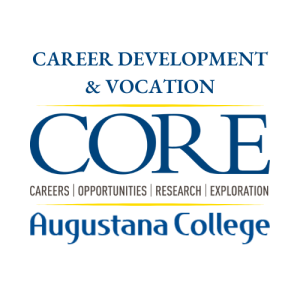Career Readiness Skills
As a student at Augustana College you will have or already have had the opportunity to gain skills related to the Augustana College Student Learning Outcomes which pair nicely with the NACE Career Readiness Skills* which employers have identified as skills they seek regardless of career field. As you move through the career development process into finding internships, full-time positions, or entrance to graduate/professional school programs identify the skills you possess from the skills listed below.
*NACE refers to the National Association of Colleges and Employers and is a leader in employer and college career information.
NACE Career Readiness Competency: Professionalism/Work Ethic
Augustana Student Learning Outcomes: Ethical Citizenship and Intellectual Curiosity
- Demonstrate dependability
- Have attention to detail, resulting in few if any errors in their work
- Take the initiative to prioritize and complete tasks on time
- Show a high level of dedication toward doing good work
- Take responsibility for their actions and quality of work without blaming others or making excuses
- Consistently meet or exceed goals and expectations
- Act in accordance with the highest possible standards of ethics and integrity
- Maintain privacy and confidentiality of sensitive information
NACE Career Readiness Competency: Oral/Written Communication
Augustana Student Learning Outcomes: Ethical Citizenship and Intellectual Curiosity
- Communicate information, ideas, and data clearly and concisely so that others can understand
- Promptly inform relevant others when needing guidance with assigned tasks
NACE Career Readiness Competency: Digital Technology
Augustana Student Learning Outcomes: Quantitative Literacy
- Display proficiency with MS Office software
- Quickly adapt to new or unfamiliar technologies
NACE Career Readiness Competency: Teamwork/Collaboration
Augustana Student Learning Outcomes: Collaborative Leadership
- Listen carefully to others, taking time to understand and ask appropriate questions without interrupting
- Build strong, positive working relationships with supervisor and team members/coworkers
- Collaborate with others to achieve common goals
NACE Career Readiness Competency: Critical Thinking/Problem Solving
Augustana Student Learning Outcomes: Critical Thinking & Information Literacy
- Gather and analyze information from a variety of sources to fully understand a problem
- Make decisions and solve problems using sound reasoning and judgment
- Multi-task well in a fast-paced environment
NACE Career Readiness Competency: Career Management
Augustana Student Learning Outcomes: Ethical Citizenship and Intellectual Curiosity
- Display curiosity: seek out opportunities to learn
- Show an awareness of won strengths and areas for development
- Accept feedback without becoming angry or defensive and use it to strengthen future performance
NACE Career Readiness Competency: Leadership
Augustana Student Learning Outcomes: Collaborative Leadership
- Motivate others by encouraging them and building mutual trust
- Serve as a role model to others by approaching tasks with confidence and positive attitude
- Exhibit maturity and self-control, even in situations involving conflict or stress
- Use innovative thinking to go beyond traditional methods
NACE Career Readiness Competency: Global/Intercultural Fluency
Augustana Student Learning Outcomes: Intercultural Competence
- Demonstrate trustworthiness, honesty, and high personal standards in dealings with others
- Treat other people, including those of different backgrounds, beliefs, and gender with fairness and respect
- Keep an open mind to diverse ideas and new ways of thinking
Augustana Student Learning Outcomes
Disciplinary Knowledge
Demonstrate an extended knowledge of at least one specific discipline and its interdisciplinary connections to the liberal arts, reflected in the ability to address issues or challenges and contribute to the field.
Critical Thinking & Information Literacy
Critique and construct arguments. This requires the ability to raise vital questions, formulate well-defined problems, recognize underlying assumptions, gather evidence in an efficient, ethical and legal manner, suspend judgment while gathering evidence, evaluate the integrity and utility of potential evidence, critique and incorporate other plausible perspectives, and determine a reasonable conclusion based upon the available evidence.
Quantitative Literacy
Interpret, represent, and summarize information in a variety of modes (symbolic, graphical, numerical and verbal) presented in mathematical and statistical models; use mathematical and statistical methods to solve problems, and recognize the limitations of these methods.
Collaborative Leadership
Collaborate and innovate, build, and sustain productive relationships, exercise good judgment based on the information at hand when making decisions, and act for the good of the community
Intercultural Competence
Demonstrate an awareness of similarity and difference across cultural groups, exhibit sensitivity to the implications of real and imaginary similarities and differences, employ diverse perspectives in understanding issues and interacting with others, and appreciate diverse cultural values.
Communication Competence
Read and listen carefully, and express ideas through written or spoken means in a manner most appropriate and effective to the audience and context.
Creative Thinking
Synthesize existing ideas, images, or expertise so they are expressed in original, imaginative ways in order to solve problems and reconcile disparate ideas, and to challenge and extend current understanding.
Ethical Citizenship
Examine and embrace strengths, gifts, passions, and values. Behave responsibly toward self, others and our world; develop ethical convictions and act upon them; show concern for issues that transcend one’s own interests and participate effectively in civic life.
Intellectual Curiosity
Cultivate a life-long engagement in intellectual growth, take responsibility for learning, and exhibit intellectual honesty.
NACE Career Readiness Competencies
Critical Thinking/Problem Solving: Exercise sound reasoning to analyze issues, make decisions, and overcome problems. The individual is able to obtain, interpret, and use knowledge, facts, and data in this process, and may demonstrate originality and inventiveness.
Oral/Written Communications: Articulate thoughts and ideas clearly and effectively in written and oral forms to persons inside and outside of the organization. The individual has public speaking skills; is able to express ideas to others; and can write/edit memos, letters, and complex technical reports clearly and effectively.
Teamwork/Collaboration: Build collaborative relationships with colleagues and customers representing diverse cultures, races, ages, genders, religions, lifestyles, and viewpoints. The individual is able to work within a team structure and can negotiate and manage conflict.
Digital Technology: Leverage existing digital technologies ethically and efficiently to solve problems, complete tasks, and accomplish goals. The individual demonstrates effective adaptability to new and emerging technologies.
Leadership: Leverage the strengths of others to achieve common goals and use interpersonal skills to coach and develop others. The individual is able to assess and manage his/her emotions and those of others; use empathetic skills to guide and motivate; and organize, prioritize, and delegate work.
Professionalism/Work Ethic: Demonstrate personal accountability and effective work habits, e.g., punctuality, working productively with others, and time workload management, and understand the impact of non-verbal communication on professional work image. The individual demonstrates integrity and ethical behavior, acts responsibly with the interests of the larger community in mind, and is able to learn from his/her mistakes.
Career Management: Identify and articulate one’s skills, strengths, knowledge, and experiences relevant to the position desired and career goals and identify areas necessary for professional growth. The individual is able to navigate and explore job options, understands and can take the steps necessary to pursue opportunities, and understands how to self-advocate for opportunities in the workplace.
Global/Intercultural Fluency: Value, respect, and learn from diverse cultures, races, ages, genders, sexual orientations, and religions. The individual demonstrates openness, inclusiveness, sensitivity, and the ability to interact respectfully with all people and understand individuals’ differences.

